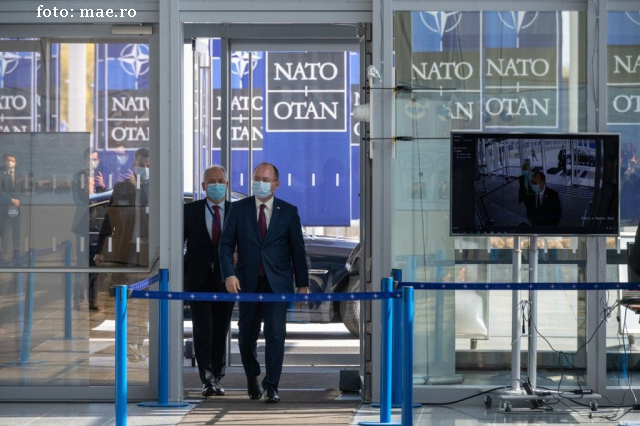Romania pleads for strengthening NATO’s Eastern Flank
At the NATO foreign ministers' meeting, Bogdan Aurescu pleaded for strengthening NATO's deterrence and defense posture on the entire Eastern Flank

Corina Cristea, 25.03.2021, 13:50
Romania wishes for an enhanced NATO role at political and military level, the Romanian Foreign Minister Bogdan Aurescu said at the NATO’s foreign ministers meeting in Brussels. It was the first physical meeting after the one in November 2019, and also the first occasion to meet the US Secretary of State Antony Blinken. The meeting focused on the NATO 2030 reflection process, and the Romanian official said he supported the proposals set forth by the NATO Secretary General in that respect.
Jens Stoltenberg stated that the global challenges that the members states face include Russia’s destabilizing activities, the threat of terrorism, cyber-attacks and nuclear proliferation and the rise of China. NATO has increased its presence in the Black Sea region with three littoral states: Turkey, Romania and Bulgaria are NATO members, and then two: Ukraine and Georgia are close NATO partners. We have increased our presence on land, at sea, in the air, but we have also stepped up the cooperation with close and highly valued partners – Georgia and Ukraine.
We will continue to do so, and we are looking into how we can further strengthen the partnership, both the political and the practical support, and we also welcome the fact that both Ukraine and Georgia are providing support and help to different NATO missions and operations Stoltenberg told a press conference.
Minister Bogdan Aurescu presented Romania’s analysis of persistent threats to security on the eastern border of the Alliance, including in the Black Sea area, also tackling the need for solutions to the lasting conflicts that have destabilized security in the region. The Romanian official reiterated support for the current NATO stand towards Russia, insisting upon the need for strengthening further NATO’s deterrence and defense posture on the entire Eastern Flank, from the Black Sea to the Baltic Sea.
A dialogue with Moscow can take place only against the background of a very robust NATO posture, the Romanian minister believes. Also, Bogdan Aurescu highlighted the relevant impact of arms control on regional security and stability and defended the need for further and enhanced NATO coordination along this dimension.
Jens Stoltenberg’s proposal to allocate a special fund for defense and deterrence, designed to encourage allies to participate, for example, in battle groups on the eastern flank, and spending to be covered by the North Atlantic Alliance, not only by the state involved in the operation, was also discussed. The NATO 2030 initiative aims to make the alliance an organization with a greater capacity for global action, especially to cope with the rise of autocratic regimes, China and Russia in particular, and threats to the international order. (MI)






























